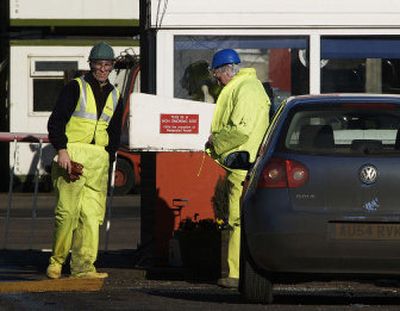Bird flu found on English turkey farm

LONDON – The deadly H5N1 Asian strain of bird flu, which has killed 165 people since 2003, has been confirmed on a commercial turkey farm in eastern England, health authorities said Saturday.
Officials said the disease has killed 2,600 turkeys on the Bernard Matthews turkey farm in Suffolk, about 130 miles northeast of London. All 159,000 turkeys at Bernard Matthews, one of Europe’s leading producers, were being slaughtered as a precaution, and television footage showed thousands of carcasses being dumped into trucks.
The outbreak is the first confirmed case of H5N1 among British domestic poultry in more than 15 years, officials said, and it comes at a time of increasing concern that migrating birds are carrying the disease from its origins in Asia through Africa, the Middle East and deeper into Europe.
While transmission of the disease from birds to humans is rare, the World Health Organization says more than 270 people have been infected with H5N1 and 165 have died since 2003, mainly in Asia. There have been no reported cases of human infection in Europe or the United States.
British health officials said the immediate risk to humans from the Suffolk case was “extremely low.” Britain’s Health Protection Agency said transmission of avian influenza from birds to humans occurs “very rarely and with difficulty” and requires “extremely close contact” with infected birds. Health officials advised the British public that properly cooked poultry and eggs were safe to eat.
“In parts of the world where widespread infection in poultry has been reported, transmission of the virus to humans has occurred very infrequently,” Maria Zambon, an influenza specialist at the health agency, said in a statement. “To date there is no evidence that avian influenza H5N1 has adapted to spread easily between humans.”
David Nabarro, bird flu coordinator for the United Nations, told the BBC that it was “exceedingly unlikely” that the outbreak in Britain would lead to human infections. “The numbers of human cases are very, very small indeed, even though the virus has been moving through poultry in at least 50 countries in the last year and led to millions of birds dying,” he said. “This is really not a human disease; it is a poultry disease.”
The cause of the current outbreak is not yet known, but the disease was most likely carried to the turkey farm by a wild bird, said a spokeswoman for Britain’s Department for Environment, Food and Rural Affairs. She said that all of the turkeys were raised on the farm from eggs produced at a hatchery that is being monitored for signs of bird flu. So far, none have been found, she said.
Bernard Matthews issued a statement Saturday confirming the outbreak but noting that “none of the affected birds have entered the food chain and there is no risk to consumers.” A company spokesman referred further inquiries to government officials.
Bernard Matthews’ Web site says it is the biggest turkey producer in Europe, raising 8 million birds a year on 54 farms in Britain. The company does about $800 million a year in business and employs more than 6,000 people, according to the Web site.
Fred Landeg, the Department for Environment, Food and Rural Affairs deputy chief veterinary officer, said that only one of the 22 turkey houses at the Bernard Matthews farm appeared to have been affected but that all turkeys on the farm were being destroyed as a precaution. Officials have imposed severe restrictions on poultry owners within a six-mile radius of the infected farm, requiring that all poultry be kept inside. Poultry owners in a larger “restricted zone” covering 2,090 square kilometers of eastern England are being advised to keep domestic birds inside and isolated from wild birds.